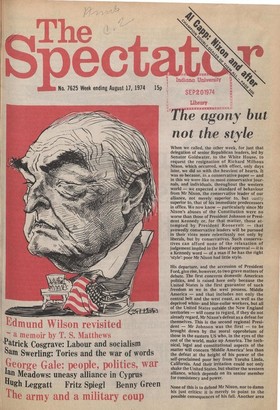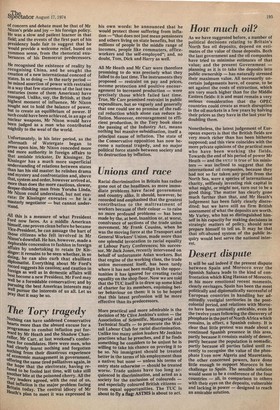e agony but
not the style
When we called, the other week, for just that delegation of senior Republican leaders, led by Senator Goldwater, to the White House, to request the resignation of Richard Milhous Nixon, which occurred, with effect, only days later, we did so with the heaviest of hearts. It was so because, as a conservative paper — and in this we were like to most conservative journals, and individuals, throughout the western world — we expected a standard of behaviour from Mr Nixon, the conservative leader of our alliance, not merely superior to, but vastly superior to, that of his immediate predecessors in office. We now know — particularly since Mr Nixon's abuses of the Constitution were no worse than those of President Johnson or President Kennedy or, for that matter, those attempted by President Roosevelt — that avowedly conservative leaders will be pursued in their vices more relentlessly not only by liberals, but by conservatives. Such conservatives can afford none of the relaxation of judgement implied in the liberal approval — it is a Kennedy word — of a man if he has the right 'style': poor Mr Nixon had little style.
His departure, and the accession of President Ford, give rise, however, to two grave matters of debate. The first concerns domestic American politics, and is raised here only because the United States is the first guarantor of such freedom as we in the west possess. Middle America — and that includes not only the central belt and the west coast, as well as the deprived whiteand blue-collar workers, but all of the United States outside the New England territories — will come to regard, if they do not already regard, Mr Nixon's defeat as a defeat for themselves. This is the second regional President — Mr Johnson was the first — to be brought down by the moral opprobrium of those in the eastern US who, in the eyes of the rest of the world, make up America. The technical, legal and constitutional aspects of the matter will concern 'Middle America' less than the defeat at the height of his power of the self-proclaimed poor boy from Yoruba Linda, California. And their irritation could not only shake the United States, but shatter the western alliance, which depends on its senior member for consistency and power.
None of this is to defend Mr Nixon, nor to damn his just critics: it is merely to point to the possible consequences of his fall. Another area of concern and debate must be that of Mr Nixon's pride and joy — his foreign policy. He was a slow and patient learner in that field; and the events of the first part of his presidency bade fair to suggest that he would provide a welcome relief, based on common sense, from the rhetorical exuberances of his Democrat predecessors.
He recognised the existence of reality by recognising China, and he sought the creation of a new international concord of states. In so doing — in the early period — he mixed assertion of power with restraint in a way that few statesmen of the last two centuries (none of them American) have managed. Unlike, say, the British, at their highest moment of influence, Mr Nixon sought not to hold the balance of power, but to create an equilibrium of power. If such could have been achieved, in an age of nuclear weapons, Mr Nixon would have been judged as a man who contributed mightily to the weal of the world.
Unfortunately, in his later period, as the aftermath of Watergate began to Press upon him, Mr Nixon conceded more and more authority in foreign affairs to that amiable trickster, Dr Kissinger. Dr Kissinger has a much more superficial understanding of relations between states than has his old master: he relishes drama and mystery and confrontation and, above that, system and order, however arrived at, more than does the more cautious, slower, deeper-thinking man from Yoruba Linda. Mr Nixon could understand, but not execute: Dr Kissinger executes — he is a Masterly negotiator — but cannot understand.
All this is a measure of what President Ford now faces. As a middle American himself, one proven clean before he became Vice-President, he can assuage the hurt of those citizens who felt involved in Mr Nixon's downfall. He has, however, made a deplorable concession to fashion in foreign affairs by undertaking to retain Dr Kissinger: it remains to be seen whether, in so doing,he can also curb that ebullient diplomatist. Everything about Mr Ford's record suggests his caution; and caution in foreign as well as in domestic affairs will best become a new President. Mr Ford may Well be a formidable conservative; and by Pursuing the best American interests may Well pursue the interests of us all. Let us Pray that it may be so.



































